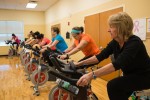The fitness centre at the Rosen JCC in Orlando, Fla. (photo by Cyndy Phillips)
For Daphna Krupp, her workouts at the Jewish Community Centre (JCC or J) of Greater Baltimore have become somewhat of a ritual. She not only attends fitness classes but also engages with the instructors and plugs the J’s social programs on her personal Facebook page.
“It’s the gym and the environment,” said Krupp. “It’s a great social network.”
Krupp, who lives in Pikesville, Md., is one of an estimated one million American Jewish members of more than 300 Js around the country. Each J – in line with the bylaws of their umbrella organization, the JCC Association of North America (JCCA) – has a fitness centre that serves as one of its core businesses. Often, the fitness centre can be perceived as a for-profit enterprise of the J, with thousands of dollars invested annually in facility maintenance and gym advertising. But Steve Becker, vice-president of health and wellness at JCCA, says that is a myth. “JCCs are not fitness centres, we are engagement centres,” he said. “All fitness-related programs are structured to be relationship-building activities.”
The institution of the J was founded in 1854 as the Young Men’s Hebrew Association (YMHA), to provide help for Jewish immigrants. A Young Women’s Hebrew Association was established as an annex to the YMHA in New York in 1888. The first independent YWHA was set up in 1902. In 1917, these organizations were combined into a Jewish Welfare Board, and later renamed Jewish community centres. “After World War One, the Jewish Welfare Board morphed into an organization to meet the cultural, intellectual, physical and spiritual needs of the Jewish community,” said JCCA communications manager Marla Cohen, noting that physical needs were always part of the equation.
The much-debated 2013 Pew Research Centre study of the American Jewish community found that 62 percent of Jews say being Jewish is mainly a matter of ancestry and culture, rather than religion. The study showed a decline in non-Orthodox individuals involved with the organized Jewish community. As such, communal leaders – from award-winning author and lecturer Dr. Erica Brown to Jewish Agency for Israel president and chief executive officer of international development Misha Galperin – have been calling for increased “low-barrier, high-content” programming to meet Jews where they are. This, says Cohen, is a niche the J can fill. “For some people, aside from High Holiday attendance, working out at the J is probably the only flavor of Judaism they have. The J could be a very big part of these people’s Jewish identity,” Krupp said.
In the last two decades, many Js have opened their doors on Shabbat, in consultation with rabbis and community leaders. “These individuals are not choosing between the JCC and synagogue. They are choosing between everything else – the mall, soccer, snowboarding, you name it – and the J,” said Cohen. “The JCC just gives Jews another option. And many JCCs have stepped in offering meaningful programs for Jews seeking something other than a traditional service.”
Read more at jns.org.
Maayan Jaffe is an Overland Park-based freelance writer. Reach her at [email protected] or follow her on Twitter, @MaayanJaffe.

